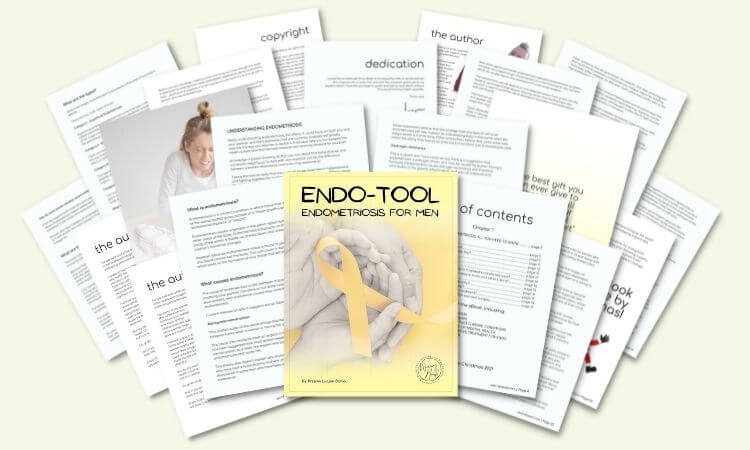Endometriosis and Negative Thoughts
We all know that endometriosis is a chronic condition characterized by tissue similar to the uterine lining growing outside the uterus, but what do physical symptoms have to do with mental health? Why endometriosis and negative thoughts are linked to each other?
Endometriosis often has an impact on mental health, leading to negative thoughts due to chronic pain and fertility concerns. The stress from managing symptoms and the lack of understanding from others can exacerbate mental strain, underscoring the importance of holistic care for both physical and mental well-being.
How do I know this?
My wife has stage 4 endometriosis that is deeply infiltrating. But this goes way deeper than that. Scroll down to find out more…
- Endometriosis and Negative Thoughts
- The Impact of Endometriosis on Quality of Life
- The Relationship Between Chronic Pain and Mental Health
- The Importance of Acknowledging Negative Emotions
- The Role of Positive Thinking in Coping with Endometriosis
- The Link Between Endometriosis and Infertility
- The Need for Open Communication and Supportive Relationships
- Managing Negative Thoughts with Mindfulness and Self-Care
- Seeking Professional Support for Mental Health
- Empowering Yourself and Finding Resources
- Source Links to Endometriosis and Negative Thoughts
Endometriosis and Negative Thoughts
Welcome to our article on endometriosis and its impact on mental health. Living with endometriosis can be challenging, both physically and emotionally. The symptoms associated with endometriosis, such as chronic pelvic pain, dysmenorrhea, and infertility, can often lead to negative thoughts and feelings. It is essential to address and cope with these negative thoughts in order to maintain your mental well-being while managing endometriosis.
Endometriosis not only affects your physical health but also takes a toll on your mental health. It is important to recognize that your emotions and thoughts are valid and deserve attention. In this article, we will explore ways to cope with negative thoughts associated with endometriosis and how to manage your mental well-being effectively.
If you want to learn more about endometriosis, I wrote an “Endo-Tool, Endometriosis for Men” e-Book.
You can get the 1st Chapter of the e-Book for FREE, and if you like it, you’ll get a Whopping 33% Discount on the Whole Book, plus discounts on other helpful tools. You have nothing to lose but a lot to gain!
The first chapter alone contains all the comprehensive medical knowledge about endometriosis, including:
- What is endometriosis?
- What are the symptoms?
- What causes endometriosis?
- What does endometriosis look like?
- What are the stages?
- What are the types?
- What is adenomyosis and how is it related to endometriosis?
- Why do some women develop severe endo and others don’t?
- Does endometriosis cause infertility?
- How is endometriosis diagnosed?
- Do types and stages affect the treatment?
- Recurrence of endometriosis after excision surgery.
FREE Chapter of “Endo-Tool”
Endometriosis e-Book for Men

The Impact of Endometriosis on Quality of Life
Endometriosis can have a significant impact on various aspects of a person’s quality of life. The symptoms and complications associated with the condition can affect not only physical well-being but also mental well-being and social life. It is crucial for individuals with endometriosis to prioritize their overall well-being and seek support when needed.
Physical Well-being
Endometriosis can cause a range of physical symptoms that can significantly impact daily life. These symptoms may include:
- Chronic pelvic pain
- Painful menstrual periods
- Abdominal pain
- Pain during intercourse
These physical symptoms can make it challenging to carry out routine activities and can often lead to fatigue and decreased energy levels. Addressing physical well-being through appropriate medical management and self-care strategies is essential for individuals with endometriosis.
Mental Well-being
The impact of endometriosis on mental health cannot be overlooked. Dealing with chronic pain, fertility challenges, and other associated difficulties can take a toll on one’s mental well-being. The emotional distress associated with endometriosis can result in feelings of anxiety, depression, frustration, and low self-esteem.
It is essential for individuals with endometriosis to prioritize their mental health and seek professional support if needed. Engaging in activities that promote emotional well-being, such as therapy, mindfulness practices, and self-care, can also be beneficial.
Social Life
Endometriosis can impact a person’s social life, leading to challenges in various social settings. The unpredictable nature of symptoms and limitations in physical abilities can make it difficult to participate in social events, maintain relationships, and fulfill social obligations.
Individuals with endometriosis may also experience a sense of isolation and frustration due to a lack of understanding and awareness of the condition among friends, family, and co-workers. It is crucial to communicate openly about endometriosis with loved ones and seek support from understanding individuals.
By addressing the impact of endometriosis on physical well-being, mental well-being, and social life, individuals can take proactive steps to improve their overall quality of life. Seeking appropriate medical care, adopting coping strategies, and building a support network can contribute to a better sense of well-being and a healthier, happier life.

The Relationship Between Chronic Pain and Mental Health
Living with endometriosis can be challenging, especially due to the chronic pain it often causes. Chronic pain is not just physical; it can also have a profound impact on your mental health. Studies have shown that individuals living with chronic pain are more likely to experience psychological distress, including depression and anxiety. It is crucial to acknowledge the powerful connection between chronic pain and mental health in order to effectively manage both aspects of your well-being.
Coping with chronic pain can be a complex and multifaceted process. It requires a comprehensive approach that addresses both the physical and emotional components of pain. By understanding the relationship between chronic pain and mental health, you can develop effective strategies for managing your pain while also promoting your mental well-being.
The Psychological Impact of Chronic Pain
Chronic pain can significantly affect your psychological well-being. The constant presence of pain can lead to feelings of frustration, helplessness, and despair. It can disrupt your sleep, limit your daily activities, and erode your overall quality of life.
Additionally, the stress and emotional strain caused by chronic pain can contribute to the development of psychological distress. These distressing emotions may include:
- Depression: Persistent feelings of sadness, loss of interest, and a lack of motivation.
- Anxiety: Excessive worrying, restlessness, and a sense of unease or fear.
- Isolation: Withdrawing from social activities and distancing yourself from loved ones.
- Anger: Frustration, irritability, and difficulty regulating emotions.
When left unaddressed, these psychological distresses can have a significant impact on your overall well-being and quality of life.
Managing Chronic Pain and Mental Well-being
Recognizing the relationship between chronic pain and mental health is the first step towards effective pain management. Here are some strategies that can help you cope with chronic pain while preserving your mental well-being:
- Develop a comprehensive pain management plan: Work with your healthcare provider to develop a personalized plan that combines medical interventions, physical therapy, and self-care strategies.
- Practice mindfulness and relaxation techniques: Engage in activities such as meditation, deep breathing exercises, and progressive muscle relaxation to reduce stress and promote a sense of calm.
- Seek support and therapy: Join support groups, seek therapy, or engage in counseling to address the emotional impact of chronic pain and develop strategies for coping.
- Prioritize self-care: Engage in activities that bring you joy and relaxation, such as hobbies, gentle exercise, or spending time in nature.
Remember, managing chronic pain is an ongoing journey that requires patience and perseverance. By taking care of your mental well-being in conjunction with your physical health, you can enhance your overall quality of life and effectively manage the challenges of living with endometriosis.
The Importance of Acknowledging Negative Emotions
Living with endometriosis can often evoke a range of negative emotions that can impact your emotional well-being. Acknowledging and validating these feelings is an essential step towards coping with the challenges of this chronic condition. It is important to remember that experiencing negative emotions is a normal response to the difficulties associated with endometriosis.
When faced with the physical pain, uncertainty, and frustration that endometriosis may bring, it is natural to feel a spectrum of emotions such as anger, sadness, and frustration. Ignoring or suppressing these emotions can lead to further distress and may hinder your emotional well-being.
Validating your negative emotions means recognizing and accepting them as valid and understandable reactions to the challenges endometriosis presents. By acknowledging these feelings without judgment, you create space for yourself to process and cope with them in a healthy and productive manner.
It is common for individuals with endometriosis to experience moments of doubt, sadness, or even guilt. These emotions can arise from feelings of frustration due to the impact the condition has on various aspects of life, such as relationships, work, and personal goals. By acknowledging these negative emotions, you can begin to address their underlying causes and take steps towards managing them effectively.
Validating your negative emotions also involves reaching out for support from loved ones or professionals who can offer empathy and understanding. Sharing your feelings can provide a sense of relief and help you feel less alone in your experience. Engaging in open and honest conversations about your emotions can foster a support network that plays a crucial role in maintaining your emotional well-being.
Ultimately, acknowledging and validating your negative emotions is a vital part of coping with endometriosis. By allowing yourself to feel and process these emotions, you can take proactive steps towards emotional healing and psychological well-being.
The Role of Positive Thinking in Coping with Endometriosis
When dealing with the challenges of endometriosis, maintaining a positive mindset can be an important factor in your overall well-being. Positive thinking can help you navigate the ups and downs of living with the condition and find the strength to cope with its impact on your daily life. While it’s not realistic to expect constant positivity, finding the silver lining and incorporating positive coping strategies can make a difference.

Addressing the Negative
It’s essential to acknowledge and address the negative aspects of endometriosis. This includes recognizing the physical pain, emotional toll, and social limitations that the condition may bring. By acknowledging these challenges, you can validate your feelings and experiences, allowing yourself to process them in a healthy way.
Having a positive mindset doesn’t mean ignoring or suppressing negative emotions. Instead, it’s about finding the strength to face these challenges head-on and search for ways to find hope and inspiration even in the face of adversity.
Finding the Silver Lining
Endometriosis may present you with unique difficulties, but it can also provide opportunities for personal growth and self-discovery. By shifting your perspective and focusing on the positive aspects of your life, you can find the silver lining amidst the challenges.
Look for moments of joy, no matter how small, and celebrate your strength and resilience. Emphasize the positive aspects of your relationships, hobbies, and achievements. Reflecting on these bright spots can provide motivation and encouragement during difficult times.
Maintaining a Positive Mindset
While it’s normal to experience negative emotions, actively working towards a positive mindset can improve your overall well-being. Consider incorporating the following coping strategies into your daily life:
- Practicing self-care: Engage in activities that bring you joy and relaxation, such as reading, taking baths, or spending time in nature.
- Practicing mindfulness: Develop a mindfulness practice, such as meditation or deep breathing exercises, to stay grounded and reduce stress.
- Surrounding yourself with support: Seek out supportive relationships with friends, family, or support groups who can provide encouragement and understanding.
Remember, maintaining a positive mindset doesn’t mean denying the challenges of endometriosis but rather finding the strength to navigate them with resilience and optimism.
| Coping Strategies | Benefits |
|---|---|
| Practicing self-care | Reduces stress and promotes a sense of well-being |
| Practicing mindfulness | Keeps you present, reduces anxiety, and enhances overall mental health |
| Surrounding yourself with support | Provides encouragement, understanding, and a sense of community |

The Link Between Endometriosis and Infertility
Endometriosis can have a significant impact on fertility, posing additional challenges for individuals hoping to conceive. The emotional impact of infertility should not be underestimated, as it can be a source of profound distress and frustration. The journey of trying to build a family can be filled with complex emotions and uncertainties.
It is crucial for individuals with endometriosis and infertility to seek support during this difficult time. Emotionally processing the challenges of infertility and finding effective coping strategies is essential for overall well-being.
Here are some key aspects to consider when coping with infertility:
- Acknowledge the emotions: Allow yourself to acknowledge and validate the wide range of feelings that may arise, such as sadness, anger, grief, or frustration. It is natural to experience these emotions, and acknowledging them can be a crucial step in the healing process.
- Establish a support system: Seek out individuals who can provide emotional support and understanding, such as a partner, close friends, or family members. Joining support groups or seeking professional counseling can also be beneficial.
- Explore different options: Consult with healthcare professionals specializing in infertility to explore potential treatment options, such as fertility treatments, assisted reproductive technologies, or adoption. Understanding available choices can provide a sense of empowerment and direction.
Remember, seeking support and exploring alternative paths to parenthood can help individuals with endometriosis and infertility navigate their journey with greater resilience and emotional well-being.
| Infertility Coping Strategies | Benefits |
|---|---|
| Joining support groups | – Provides a sense of belonging and understanding – Offers an opportunity to share experiences and advice – Promotes emotional healing and resilience |
| Seeking professional counseling | – Provides a safe space to express emotions and concerns – Equips individuals with coping tools and strategies – Offers guidance in making informed decisions |
| Exploring alternative paths to parenthood (e.g., adoption) | – Opens up new possibilities and avenues for building a family – Provides an opportunity to give a loving home to a child in need – Fosters a sense of purpose and fulfillment |
The Need for Open Communication and Supportive Relationships
When it comes to coping with endometriosis and managing negative thoughts and emotions, open communication and supportive relationships play a crucial role. By engaging in honest and open conversations about endometriosis, you can help educate your friends, family, and partners about the condition, fostering understanding and support.
Seeking support from loved ones who genuinely empathize with your experience can make a significant difference in your emotional well-being.
One way to foster open communication is by providing information and resources to your loved ones. By sharing reliable sources and educational materials, you can help them develop a deeper understanding of endometriosis and its impact on your life. This can be particularly helpful in debunking common misconceptions and myths surrounding the condition, allowing for more informed and supportive conversations.
In addition to seeking understanding from your inner circle, connecting with support groups or therapy can be immensely beneficial. Support groups provide a safe space to share your experiences, emotions, and challenges with others who can relate. Connecting with individuals who have firsthand experience with endometriosis can offer validation, valuable insights, and a sense of belonging.
Therapy is another valuable resource for managing negative thoughts and emotions related to endometriosis. A therapist can provide guidance, offer coping strategies, and help you develop healthy ways to navigate the emotional challenges that often come with living with a chronic condition. Working with a mental health professional can empower you with the tools and support you need to improve your overall well-being.
Remember, seeking support and fostering open communication are vital steps in your journey with endometriosis. By surrounding yourself with understanding and empathetic individuals, you can navigate the emotional ups and downs while building a strong support system that uplifts you.
Key takeaways?
- Openly communicate with friends, family, and partners about endometriosis to foster understanding and support
- Share reliable resources and educational materials to debunk myths and misconceptions
- Connect with support groups to find empathy, validation, and a sense of belonging
- Consider therapy to develop coping strategies and navigate emotional challenges
- Surround yourself with supportive individuals who uplift and understand your experience

Managing Negative Thoughts with Mindfulness and Self-Care
Mindfulness practices and self-care techniques can be powerful tools in managing negative thoughts and emotions associated with endometriosis. By incorporating these practices into your daily routine, you can cultivate a sense of calm and promote your overall well-being.
1. Embrace Mindfulness
- Engage in meditation to quiet the mind and promote self-awareness. Focus on your breath and observe your thoughts without judgment.
- Practice mindful eating, savoring each bite, and paying attention to the sensations and flavors.
- Engage in mindful movement such as yoga or tai chi, which can help you connect with your body and alleviate stress.
2. Prioritize Self-Care
- Set aside dedicated time for activities that bring you joy and relaxation, whether it’s reading a book, taking a bath, or spending time in nature.
- Nurture your body with healthy, nutrient-rich foods that support your overall well-being. Eat a balanced diet and stay hydrated.
- Ensure you get enough restful sleep each night to recharge and rejuvenate your body and mind.
Practicing self-care and mindfulness not only helps you manage negative thoughts and emotions but also reduces stress and improves your quality of life.
Seeking Professional Support for Mental Health
When living with endometriosis, it is important to recognize that seeking professional support for your mental health can make a significant difference. Therapy, counseling, and other mental health interventions can provide you with the tools and support you need to cope with negative thoughts and emotions and improve your overall well-being.
Endometriosis can have a profound impact on your mental health, as the physical symptoms and challenges associated with the condition can take a toll on your emotional well-being. It is common to experience feelings of frustration, sadness, anxiety, or even depression while managing the condition. Seeking professional help can help you navigate these challenges and develop effective coping strategies.
Therapy and counseling sessions can provide a safe space for you to express your emotions, gain insights into your experiences, and learn effective techniques to manage the negative thoughts and emotions that may arise. A qualified mental health professional can guide you through the process of understanding and addressing your mental health concerns while living with endometriosis.

Benefits of Seeking Professional Support
By seeking professional help for your mental health, you can:
- Gain a better understanding of how endometriosis may be impacting your mental well-being
- Learn effective coping strategies to manage negative thoughts and emotions
- Receive support and guidance tailored to your individual needs
- Explore techniques to improve your overall mental well-being
- Develop healthy coping mechanisms and self-care practices
- Address any underlying mental health concerns, such as anxiety or depression, that may be exacerbated by endometriosis
How to Find a Mental Health Professional
When seeking professional support for your mental health, it is important to find a mental health professional who has experience working with individuals living with endometriosis or other chronic conditions. You may consider:
- Asking for recommendations from your healthcare provider or gynecologist who may have connections to mental health professionals specializing in endometriosis
- Researching therapists or counselors who specialize in women’s health or chronic pain management
- Checking with your health insurance provider for a list of covered mental health providers
- Visiting reputable mental health directories or online platforms that can help you find professionals with expertise in endometriosis-related mental health support
Remember, seeking professional support for your mental health is not a sign of weakness. It is a brave and proactive step towards prioritizing your overall well-being while navigating the challenges of living with endometriosis.
Empowering Yourself and Finding Resources
When it comes to managing negative thoughts and emotions associated with endometriosis, empowering yourself and actively seeking out resources and support systems is crucial. By taking an active role in your own mental well-being, you can regain a sense of control and resilience.
One way to empower yourself is by attending support groups specifically tailored for individuals with endometriosis. These groups provide a safe space for sharing experiences, gaining support, and learning coping strategies from others who understand what you’re going through. Additionally, connecting with online communities can offer a sense of belonging, as well as a platform to discuss your concerns and seek advice from those who have similar experiences.
Staying informed about the latest research and treatment options is also important in empowering yourself. By keeping up with the latest advancements and knowledge surrounding endometriosis, you can make informed decisions about your own healthcare and advocate for yourself effectively.
Remember, you have the power to take control of your mental well-being. By proactively seeking support, connecting with others, and staying informed, you can empower yourself to navigate the challenges of endometriosis and lead a fulfilling life.


About Me
Hi, I’m Lucjan! The reason why I decided to create this blog was my beautiful wife, who experienced a lot of pain in life, but also the lack of information about endometriosis and fibromyalgia for men…
